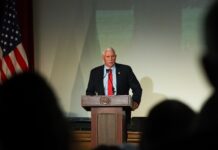The COVID-19 pandemic has spent the last year working its way to affect every facet of life and put a strain on everything we do.
The spread of the disease has forced lockdowns and travel restrictions that have kept many apart. Those not under such restrictions have kept to their immediate family, their cohort, out of fear of spreading the disease. Still, isolation has begun to create new problems for those who feel trapped inside with their significant other.
For Slippery Rock University (SRU) alums Christine Murcko and Sean Patt, getting almost a year head start on adapting to living together helped them adjust to pandemic life, but still brought challenges.
Patt, a former defenseman for SRU’s Hockey Club, said the time spent in their two-bedroom Cooper Street apartment before the pandemic gave them time to adjust to how one another liked things done before graduating in December 2019.
“That was probably the most difficult work,” Patt said. “Kind of finding a middle ground.”
Murcko said she felt differently, though. By the time the couple moved into Patt’s parent’s home in Hummelstown, Pennsylvania, in March of 2020, they had been together for four years and she felt they understood each other well.
Then the lockdowns began happening across Pennsylvania.
Patt’s childhood bedroom was supposed to be a temporary stay turned into an eight-month stay with the two cramped into a 12-foot by 12-foot room complete with a full-size bed, three dressers, and a desk.
Murcko and Patt began to realize what my fiancée and I, along with millions of people across the world locked down, were learning – our living spaces were too small to work and live in day-in-day-out.
For us, the two-bedroom we have with my son began to close in as we turned corners of bedrooms and hallways into offices for school and work, which was all remote now.
If Murcko wanted time away from Patt’s parents, she did not have many comfortable options to choose.
“The only place to sit in that one room was just on the bed or in a desk chair,” Murcko said.
As couples began to spend every hour of the day with each other, licensed professional counselors like Susan Bella-Nesbitt said it takes a toll on individuals’ mental health.
“A lot of people feel trapped inside their house; they feel suffocated,” Bella-Nesbitt said.
For many of her clients, the lack of human interaction and trying to stay engaged every day when school and work are just one Zoom meeting to another becomes difficult.
Bella-Nesbitt, who sees clients in Butler, Pennsylvania, said they become fatigued by the constant hopping from screen to screen and lack of physical activity.
Zoom burnout is something many have begun to feel, myself included, as the pandemic passes its first anniversary. For myself, the stress has led to small, meaningless fights with my fiancée over items we cannot even describe halfway through.
Bella-Nesbitt suggests couples who feel like they may be pushing on each other emotionally find some time and an activity that can be done separately, but safely and has a physical component. One of the best things about the state of the pandemic today, Bella-Nesbitt said, is people can safely go out to places like the gym or grocery store, and as long as they are masked up and distancing, these activities may be done with a friend or family member.
“I encourage a lot of activity to snap out of it because they really do need to move,” Bella-Nesbitt said.
Getting time apart was something Murcko and Patt could accomplish because both of their jobs stayed open during the pandemic. While both saw reduced hours at times, for up to 12 hours a day, Patt would be at his job at a local beer distributor while Murcko would go into her graphic design job at Tex Visions in Carlisle.
With time working apart and finding activities to do together, like discovering new series to watch on Netflix, the couple has been able to minimize the tension between each other. During this time, others find the pressures of being home all the time are compounding other stressors caused by the pandemic.
Financial stress from one or both parties losing their job has created a tremendous amount of pressure on individuals, especially if they were the family’s primary income source, Bella-Nesbitt said. That pressure, coupled with feelings of inadequacy and decrease in self-esteem, becomes tension points for the other spouse who may have been used to taking care of the household. Now, having to take the other person’s expectations about how they prefer things to be done, both halves of the relationship become strained.
Unfortunately for some, this strain does not always lead to the couple seeking counseling, but violence.
In March 2020, the National Domestic Violence Hotline (NDVH) began collecting data on how the pandemic impacted domestic violence survivors. During the 60 days, information collected showed a 9% increase in the total number of contacts the hotline received. Persons age 19-24 consisted of 17% of the more than 62,000 contacts received.
More than 6,000 individuals who contacted NDVH said the COVID-19 pandemic affected them reaching the hotline.
Kaeleen Martin, the prevention education advocate for Victim Outreach Intervention Center (VOICe) in Butler County, said the center did not see a massive jump in calls during the pandemic, but speculated that being stuck at home with an abuser played a part in that.
“Before [the pandemic] calls would be like, ‘I have 10 minutes to talk, like, I want to kind of just get this out, I want to see what I can do,’” Martin said. “Versus now, like people are just stuck in the same space with the same people all the time.”
“And I think it might have even gotten harder for people to reach out,” Martin added.
According to a report by the NDVH, 69% of calls to the national hotline were from victims who had just been subjected to Intimate Partner Violence (IPV) and were seeking resources.
With the pandemic still isolating people from their friends and family, it is important people who have concerns reach out and offer support, Martin said.
While the pandemic effects have put strains on relationships, including my own, for Murcko and Patt, it had helped strengthen theirs, even when the virus dealt a significant blow, infecting Murcko along with Patt’s parents.
Mid-October and ready to move into their own place, they had to reschedule the signing of their lease while Murcko and Patt stayed locked up in Patt’s childhood bedroom. Patt, who had not contracted the virus but was required to stay home from work for 16 days, took on the role of caregiver, running water and Tylenol to Murcko when needed.
Murcko said Patt’s parents’ symptoms were a lot worse than hers, with them fighting horrible, constant coughs. For her, the first few days resulted in the worst migraine of her life, with her symptoms subsiding to something more like the stomach flu.
For Murcko, that wasn’t the worst part, however.
“He wouldn’t kiss me for three days,” Murcko jokingly complained.
Patt said he was doing his best not to contract the virus, but when he realized he had been in close contact with all his family members due to the living situation and not become ill, he gave in to make her feel better.
“She’s just dramatic,” he smirked.
Having now got through the most challenging part the pandemic had thrown at them, they moved into their apartment in November and begun making it a place of their own. With restrictions slowly easing up, they are finding time for themselves and each other.
While Patt does most of the cooking, they make sure they are eating dinner together to catch up on what is going on in each other’s life. Along with still working at the beer distributor, Patt became the head defensive coach for the Elizabethtown High School Ice Hockey Team.
As for Murcko, she spends her free time playing video games like The Sims and Harvest Moon or watching a television show only she likes.
“‘Parenthood.’ That’s my show,” Murcko said. “But I only get to watch those when he’s not here.”
When both are home, she said the TV has either a show they both enjoy, like “Lost” or a hockey game. They also try to get out around Mechanicsburg and learn about the city they now call home.
They both agree that they have fared well through uncertain times because of their effort before the pandemic.
From what she has seen, Bella-Nesbitt said couples who took the time to address problems in their relationship early on, especially before the pandemic, have had better outcomes. Still, she finds people are hesitant to reach out for help when things are not going well.
“[People are] very kind-hearted … and they just kind of give people passes all the time,” Bella-Nesbitt said. “But if it’s affecting the intimacy, if it’s affecting the closeness, if it’s affecting communication, those are things you really shouldn’t let go.”
Identifying these new stressors put on by the pandemic has had counselors like Bella-Nesbitt and others wanting couples to seek out help early to mitigate these effects.
I have been seeing a counselor at the Department of Veterans Affairs for two years now. My counselor has encouraged other veterans, including myself, who are seen for many reasons, to bring our significant other into the fold to help treat the patient’s complete picture.
For couples out there who are in an unhealthy situation or those like my fiancée and I who are just finding the stress of not having personal space too much, agreeing to reach out is an essential first step.
Those who wish to reach out for help or know someone in need of assistance should contact one of the resources below:
- SRU Student Counseling Center – 724.738.2034
- VOICe 24 Hour Hotline – 1.800.400.8551
- National Domestic Abuse Hotline – 1.800.799.7233









